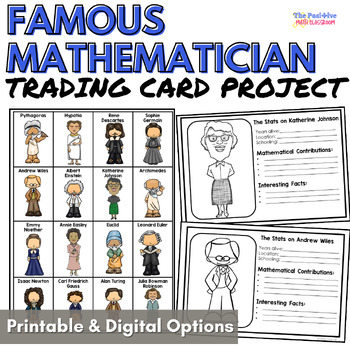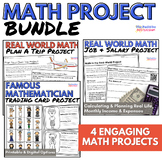Famous Mathematicians Math Project
- PDF
What educators are saying
Also included in
- These ready to use projects are sure to be a hit with your middle school students as they learn more about using math in the real world. Not only can these be used anytime during the school year, but they are especially great to use as an end of the semester or end of the year math project. You wilPrice $14.35Original Price $20.50Save $6.15
Description
Challenge your students with this famous mathematician project that will have them learning about people who have greatly impacted the world of mathematics. This math project is especially great for the end of the year. Best of all, your purchase includes a printable PDF with everything you need to implement this project, as well as a digital version using Google Slides™.
In this project, students will choose four mathematicians to research from a list of sixteen. Based on their research, students will create trading cards for each mathematician they choose. When students finish the project you can either have them share information with the class or hang up the trading cards in your classroom. Students can then use their learned information to complete a crossword puzzle.
Included with this project are the following:
- Teacher information sheet with a guide on how to implement the project as well as ideas for extensions.
- Directions and link to the digital version using Google Slides™.
- Student project sheet that includes twenty famous mathematicians to choose from.
- Student research page to help students organize their information when researching each mathematician.
- Half-sheet trading card templates that include each mathematician's picture.
- Large trading card template for students to draw their own picture.
- Grading sheet
- Background information on each mathematician for easy teacher reference.
- Crossword Puzzle for an end-of-project activity that covers all 16 mathematicians.
Mathematicians Include:
- Andrew Wiles
- Alan Turing
- Archimedes
- Albert Einstein
- Annie Easley
- Carl Friedrich Gauss
- Emmy Noether
- Euclid
- Hypatia
- Isaac Newton
- Julia Bowman Robinson
- Katherine Johnson
- Leonard Euler
- Pythagoras
- Rene Descartes
- Sophie Germain
Check out some of the great feedback for this math project below:
"Perfect research opportunity in the math class for early finishers, homeroom time, or as a project."
"I have used these in place of projects for some of my kids. This made life easier for them and me. Loved it!!"
"Awesome end-of-the-year project!!"
You may also be interested in these other math projects:
Real World Math: Investigating Jobs, Salaries and Budgets
Math Art Project: Fractions, Decimals, and Percents
Pumpkin Math: Volume and Surface Area Activity
Click here to follow me for updates on new products that are always 50% off for the first 24 hours!






